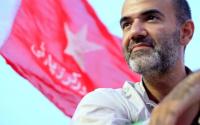lnternational Herald TribuneJuly 18, 2002
SAMOS, Greece -- A note of frustrated anger is now audible in European criticism of the Bush administration's foreign and economic policies. American defiance of what Washington likes to call "the rest of the world" was the subject most discussed in this year's weeklong Papandreou Foundation seminar in Greece, bringing European government and international institution officials together with U.S. academics and observers.
Idealistic European internationalism and legalism were argued against the market fundamentalism, aggressive nationalism and exceptionalist convictions of the current government in Washington.
European objections to the administration's repudiation of arms treaties and the new international war crimes tribunal, as well as criticisms of the implausibility and contradictions in U.S. Middle East policy, were expressed with feeling.
Former President Bill Clinton, present for part of the meeting, offered his own story on what went wrong in the Middle East, while suggesting that nothing went wrong with America's international economic policy on his watch, except for the odd mistake.
The most effective critic of that policy, Joseph Stiglitz, the Nobel laureate and former economic adviser to Clinton, had a great deal to say about the economic constraints imposed on countries like Argentina, today on the verge of collapse thanks to the implacable demands of the International Monetary Fund for deflationary reform in an economy needing growth.
He said the European Union should itself have intervened in the Argentine crisis, reminding Washington that in the globalized economy, the Monroe Doctrine no longer applies. The EU could have supplied credits allowing Argentina to shift to expansionary policies and begin again to create jobs and restore growth.
To do so, however, would have meant policy confrontation with Washington, and while the Europeans are generous with criticism, their governments consider themselves powerless to challenge the United States.
There is an irony in this, since many Americans currently accuse the West Europeans of defeatism or appeasement. This supposed defeatism concerns terrorists and rogue states, which only Washington is supposed to have the courage to confront.
The U.S. critics resist the notion that Europeans generally discount the terrorist threat. The Europeans' defeatism actually lies in their unwillingness to say as much to the United States.
The Bush administration's case against the International Criminal Court, for example, is merely the Republican elite's rerun of the populist right's old fantasy of UN troops landing from black helicopters to impose a sinister New World Order on the United States.
As such, it is nonsense, but nonsense from which American politicians are unlikely to retreat, given the Pentagon's determination to be free from international legal and political constraints.
The Europeans nonetheless gave the United States the yearlong exemption from the court's jurisdiction that it demanded, notwithstanding pressures in Europe that "this time" Europe stick to its convictions and call the self-defeating U.S. bluff to veto future UN peacekeeping missions.
In trade matters, Europe displays its strength. The European Commission consistently challenges the United States on trade and competition issues, and often wins.
In response to recent Bush administration sanctions on steel imports, it went so far as to threaten to target reprisals against U.S. exports from Florida and other states crucial to the Republican congressional campaign this autumn.
At another level, however, a political and intellectual cringe still marks European policy. European officials sometimes seem to think that criticisms of U.S. policy are valid only when they come with the endorsement of an American dissenter.
Thus, Joseph Stiglitz has provoked enormous interest with his attack on the Washington economic consensus, dominant in American academic economics, as well as in the policy of the government and the U.S.-dominated international lending institutions, since the Reagan years.
His new book, "Globalization and Its Discontents," has had front-page treatment in Britain and on the Continent. Stiglitz was chief economist of the World Bank and entered into dissidence, so to speak, after witnessing the application in poor countries of ideologically motivated IMF policies that frequently left them even poorer.
Argentina was the IMF's star protégé for seven years, accepting deflationary measures that tied it to an unrealistic exchange rate, producing severe unemployment, poverty, and social and political crisis.
Stiglitz thinks that the Europeans could make a difference if they offered independent European initiatives that provided alternatives to American unilateralism. In that way, it would be within their power to restore a measure of multilateralism to an international scene rather in need of it.






